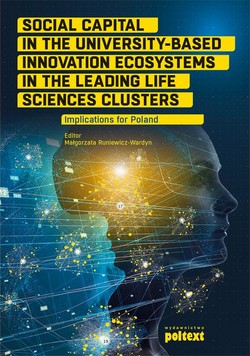Social Capital in the University-Based Innovation Ecosystems in the Leading Life-Science Clusters: Implications for Poland

Реклама. ООО «ЛитРес», ИНН: 7719571260.
Отрывок из книги
Over the last decade, research in the field of technology and innovation has subsequently progressed toward the development of the notion of an ‘ecosystem’. Such an approach became particularly useful in understanding the dynamics related to the complex process of invention and its translation into an innovation which spreads further on into society and into what was highlighted in the latest Europe 2020 Growth Strategy and Cohesion Policy 2014–2020 as smart growth. The concept of an ecosystem lies within the idea that innovation and technological advances do not stem from the inventive efforts of one person, but rather collective research efforts and social interactions. In fact, smart growth starts from the bottom-up entrepreneurial discovery process about a region’s assets, its challenges, competitive advantages and the potential for excellence (European Commission 2012). In this approach of the priority setting of the region’s specialization, local dynamic externalities, social networks, and university-industry collaborations play a crucial role. The role of social collaboration networks seems to be even more important in the case of such dynamic industries as biotechnology where research is more complex and interdisciplinary.
The present monograph contributes to the emerging debate on the topic of innovation ecosystems by delivering new insights into and knowledge of the role of social capital, social networks and collaborative social environments in the successful life sciences innovation ecosystems. The authors applied a qualitative interview and direct observation methods which allowed to better understand the complex nature of the life sciences university ecosystem and more importantly, the process of social networking within it. The research study covered several well-established life sciences university-based ecosystems in the European Union and the United States. For the purpose of comparison, the study also considers Poland’s emerging life sciences sector. It is expected that the research findings, along with the recombination of the relevant subject literature and other collected empirical evidence, will make it possible to contribute to the development of strategies and policy measures to further unlock the innovation potential of the emerging life sciences sector in Poland.
.....
Source: Ramos-Pinto (2012).
Notwithstanding, the classification made above may lead to an overly simplified and even contradictory image of the social capital networks. In practice, social relationships are far more complicated and usually accompanied by multiple overlapping relationships that individuals have with each other. Thus, a typical relationship would have some characteristics of bonding and some characteristics of bridging social networks. Last but not least, bonding and bridging are not completely mutually exclusive and the final structure of the network configuration depends on the type of knowledge interlinkages present in a particular cluster, its technological dynamics, as well as the importance of other dimensions of social capital, i.e. physical, cognitive, organizational, cultural and communication ones.
.....